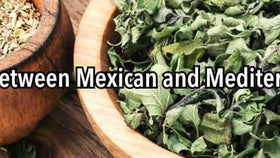Can Spices Be Frozen?
Is Freezing an Acceptable Means of Spice Preservation?
Sometimes a particular spice is essential to bring a recipe to life, even if it’s not a staple in your everyday cooking. Other times, you might get a little overzealous at the spice market, swept away by the intoxicating aroma of something rare and intriguing. So trust me when I say, “we get it” when we're asked whether or not spices can be frozen. Letting those beautiful spices deteriorate over time would be a dreadful shame.
Freezing might seem like a logical way to lock in their freshness, but when it comes to spices, freezing likely isn't the best option. That said, it isn’t a simple yes-or-no question. In this article, we’ll explore the factors that should be considered before putting your spices on ice.
What Happens When You Freeze a Spice?
When it comes to preserving spices via freezing, there is no straight and narrow path. For some spices, it is a perfectly acceptable means of short-term preservation, whereas with others, we definitely wouldn’t recommend it. And, should you choose to do so, it’s best to keep in mind that what works for one spice, may not work for others, so you should choose your method wisely.
It’s important to consider that while freezing won’t ruin most spices, it will undoubtedly change them. Spices, especially ground ones, contain volatile oils and other chemical compounds that give them their signature aroma and flavor. These elements may not fully disappear in the freezer, but they can be affected by even small amounts of moisture. That means clumping, subtle shifts in texture, and sometimes a noticeable drop in flavor and aromatic qualities Whole spices are a bit more resilient, but they’re not immune to the effects of freezing and thawing.
When Freezing Can Be Useful
There are times when freezing spices makes sense but those times are few and far between.
If you’ve purchased a large quantity of a spice you aren’t able to use up quickly, freezing can help preserve its quality. This is especially true for whole spices with higher oil content or for spice pastes. These fresh, moisture-rich preparations benefit far more from freezing than dry spices ever will.
We especially wouldn’t recommend freezing finely ground spices, as they tend to absorb moisture easily, leading to clumping, diminished flavor, and a frustratingly uneven texture once thawed.
How to Freeze Spices
Method 1: Freezing as is - To freeze spices effectively, don’t just throw the containers directly in the freezer. Start by dividing them into single-use portions rather than tossing them all in the same container and opening it every time they are needed. This helps minimize exposure to air and moisture, which are the culprits of degradation of flavor and aroma. Storing individual portions will ensure you can grab only what you need without compromising the rest.
This method works best for whole spices and spice pastes. Use a vacuum sealer for each portion if you have one. If not, airtight containers or freezer-safe bags will do the trick. Whatever storage method you choose, be sure to clearly label each portion with the spice name and date.
Method 2: Freezing in oil - For fresh herbs and spice pastes, try freezing individual servings in ice cube trays. Scoop the pastes directly into the trays or, for the fresh herbs, use a neutral oil like grape seed or olive oil. Once frozen, transfer the cubes to a freezer bag for easy use. The oil preparation works especially well for herbs and spices like garlic, ginger, turmeric, basil, or cilantro. To use, toss them directly in a pan for sautéing or add them to soups, sauces, dressings, or marinades.
Spices That Should Never Be Frozen
Let me be clear, freezing spices is not typically recommended, but this is especially true for the following:
Ground Spices
Most ground spices don’t respond well to freezing. Their fine texture and large surface area make them particularly vulnerable to moisture and oil release. Even with the best intentions, you may end up with clumpy, dull-tasting seasoning that’s lost much of its original potency.
Salts and Blends Containing Salt
Spice blends that include salt or salt itself will be even more problematic if frozen. Salt attracts moisture, and freezing may cause it or the spices blends it is in to harden, develop an uneven texture, or even mold, making it difficult to use, altering the balance of your blend, or making it dangerous to consume.
Storage Tips for Maintaining Spice Flavor and Aroma
Freezing may seem like a safeguard, but most of the time, understanding the needs of each particular spice and practicing good pantry habits will be more effective.
Only purchase what you need - In most cases, it’s best to purchase only as much spice as you can use within a couple of months. The temptation to stock up during a bulk sale is understandable, but we recommend buying only the quantity you need if you have a specific use in mind right away. For example, purchasing bulk vanilla beans makes sense if you plan on making homemade vanilla extract or Kahlúa for gifts.
Keep them sealed until use - Don’t open spices until you are ready to use them and if the quantity is more than you think you will need, place it in an airtight container (or vacuum seal) and store them in a cool, dark space.
Maintain optimal temperature and moisture levels - Always store spices away from heat and humidity. A spice rack above the stove might be convenient, but it’s one of the worst places for long-term storage. Glass jars or metal tins work well, especially if they’re tinted or opaque.
Practice FIFO (First In, First Out) - Rotate your stock regularly and label containers with purchase dates. When stored properly, many whole spices will maintain their integrity for many months.
Buy whole spices, when possible - As spices are ground, the volatile oils responsible for their distinct flavors and aromas begin to dissipate. To retain maximum freshness and potency, it’s best to buy spices whole and grind or grate them as needed. You may be surprised at how much more vibrance you will get out of whole spices than their ground counterparts.










Slofoodgroup
Auteur